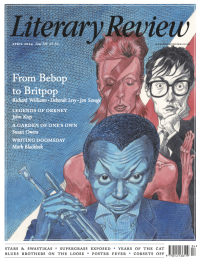Nigel Andrew
Fake It Till You Make It
The Book Forger: The True Story of a Literary Crime That Fooled the World
By Joseph Hone
Chatto & Windus 336pp £22
This book has a great story to tell – the author calls it, without exaggeration, ‘perhaps the most sensational literary scandal of the last hundred years’ – and Joseph Hone narrates it brilliantly. Strictly speaking, it was not quite a ‘literary’ scandal but rather a bibliographical one, as it involved the faking of physical books, not their contents. It was a scandal affecting the most exalted levels of book collecting and the book market, and the man responsible for the faking was one of the most revered authorities and collectors of the first part of the 20th century, Thomas James Wise.
The story of Wise’s most egregious crimes was first told by the two men who uncovered them (further crimes came to light later, revealed by Hone himself, among others). The booksellers John Carter and Graham Pollard published their findings in 1934 in a book with the deceptively bland title An Enquiry into the Nature of Certain Nineteenth Century Pamphlets. It caused an instant sensation, not only shaking the antiquarian book trade and dethroning Wise, but also becoming a news story. It was the result of a long process of painstaking detective work, making use of the latest forensic techniques, notably the chemical analysis of paper. Carter and Pollard’s exposé stuck scrupulously to the facts, and the authors took care to stay out of the courts by never actually stating Wise’s guilt. The evidence they presented was so overwhelming that they didn’t need to.
Hone expertly spins two narrative strands. They start out in parallel but increasingly intertwine, finally coming together in an account of Pollard’s climactic face-to-face confrontation with the cornered Wise. One narrative strand follows Wise from his early days in the various literary societies that thrived in late Victorian times, through

Sign Up to our newsletter
Receive free articles, highlights from the archive, news, details of prizes, and much more.@Lit_Review
Follow Literary Review on Twitter
Twitter Feed
The latest volume of T S Eliot’s letters, covering 1942–44, reveals a constant stream of correspondence. By contrast, his poetic output was negligible.
Robert Crawford ponders if Eliot the poet was beginning to be left behind.
Robert Crawford - Advice to Poets
Robert Crawford: Advice to Poets - The Letters of T S Eliot, Volume 10: 1942–1944 by Valerie Eliot & John Haffenden (edd)
literaryreview.co.uk
What a treat to see CLODIA @Lit_Review this holiday!
"[Boin] has succeeded in embedding Clodia in a much less hostile environment than the one in which she found herself in Ciceronian Rome. She emerges as intelligent, lively, decisive and strong-willed.”
Daisy Dunn - O, Lesbia!
Daisy Dunn: O, Lesbia! - Clodia of Rome: Champion of the Republic by Douglas Boin
literaryreview.co.uk
‘A fascinating mixture of travelogue, micro-history and personal reflection.’
Read the review of @Civil_War_Spain’s Travels Through the Spanish Civil War in @Lit_Review👇
John Foot - Grave Matters
John Foot: Grave Matters - Travels Through the Spanish Civil War by Nick Lloyd; El Generalísimo: Franco – Power...
literaryreview.co.uk